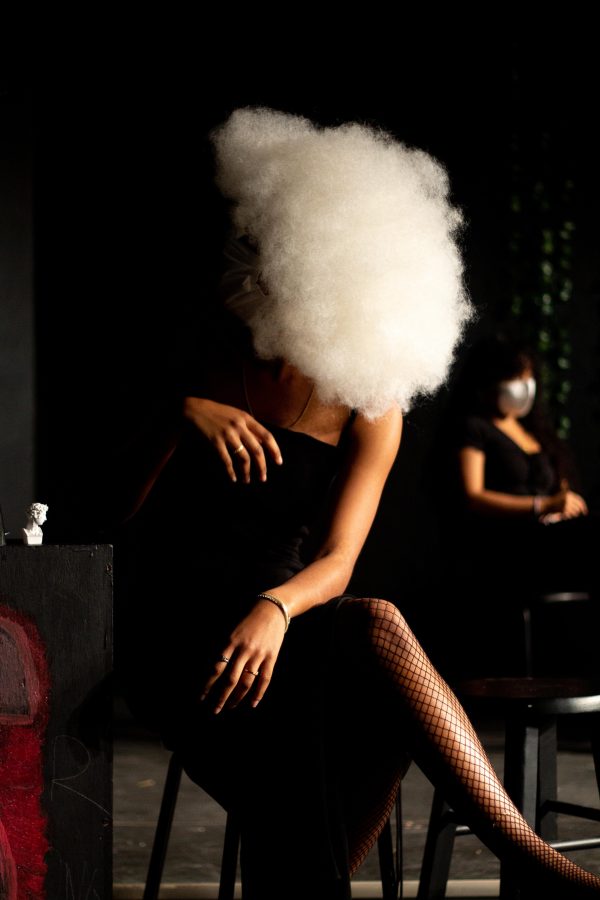Farm house recently held two large scale events. 6th weekend featured Farm House’s Film and Art Festival (the houses second ever film festival, first art festival since the pandemic has begun, and the first time these events have been held jointly).
The Film and Art Festival featured a houseful of student work. The basement held a gallery of student photography as well as multimedia installation. The ground floor featured a sculpture gallery. One festival favorite was an interactive electronics piece that allows one to play a plant as an instrument (or really any lifeform, the only requirement is something be conductive, but it is tailored to be used with plants). The second floor featured printmaking, paintings, and drawings. Work by both Intaglio and Woodcut printmaking classes flanked the hallway. As the sun set, attendees moved outside for a student film festival. Students submitted work made in Digital Foundations, Nonfiction, as well as in their spare time. The work was stylistically diverse and well received by the crowd. Following the screening, a couple filmmakers introduced themselves and their projects.
Farmstock just happened on 5/14. Farmstock is an annual spring tradition begun in the 1980s. Central to the event is the roasting of an entire pig throughout the night preceding the event. Farmhouse is vegetarian, but for this day, the farmies eat meat. Some theories for why this happens include: a reminder that Farmies aren’t any better than meat eaters, a reminder why they are vegetarians, and because slow roasted pig is a delectable treat. The day featured six hours of students (and professors) performing live music. Featured student bands included Dookie House and Sproncert headliners-to-be Paranoid Fiction and Beans of Production. The two professors who performed were Daniel Groll of the philosophy department, who led a call-and-response number about turkeys, and music professor Andrea Mazzariello, who played the piano. The pig was butchered as the first acts warmed up the crowds. A couple hundred members of Carleton’s community cycled through throughout the day. As the sun set, a fire was set and stragglers gathered round for evening conversations. A couple Farm House alum joined for the event, one from 1977. The sun shone upon Farmstock, the pig must have smiled upon the farmies as it began its journey to the 3rd circle of hell, where it will live forever more. Next year will bring another pig’s death but, until then, the farmies have returned to their vegetarian diets.
A central feature of Farmstock is the volunteering that occurs on the Student Organic Farm. Located in the backyard of Farm house, the Carleton Student Organic Farm is 1.5 acres of land that three Carleton students manage each season as part of an internship program run by the Sustainability Office. Hoping to connect students with their local food system, the farm interns helped attendees of Farmstock weed crops, organize supplies, and prepare the fields for the start of the season.
The residents of Farm House plan events like these as a group several months in advance, a process that often ends up daunting. The Film and Art Festival was carefully mapped out, but steup ended up being a “minor scramble” according to Isaac Crown Manesis. “We learned a lot about how hard it is to hang art on the the walls,” Anna Klein said to a chorus of agreement. In addition to setting up the stage and cleaning the yard, the farmies “had to cook a lot of food—enough for several hundred people,” according to Arya Misra, even though “all the interest houses chip[ped] in.” Then there was the outdoor pig roast, which took 12 hours and required that the farmies “sign up for shifts so that people [could] be there all throughout the night,” Anna Klein says.
The farmies nevertheless believe the festival was successful overall. “You get a lot done when there’s 17 people living in a house,” Anna Klein tells us. “When everyone’s home, it’s easy.”
Farmies pride themselves on their traditions, which they try to extend to the broader campus. “We know that it is a very insular-ish space,” says Arya Misra, “but we like to share it. And we like to throw events, invite the rest of the community and find space for different groups of people to interact… The fact that it’s a little isolated helps us cultivate a specific culture and traditions that are unique to us in a way of living.”
Asked to describe that culture in one word, Arya Misra picked “intentional.” “We have cooking shifts every day of the week… [and] chores every day,” she explains. “We wanted to live in a community that’s focused on sustainability, and that’s why we’re here.”













